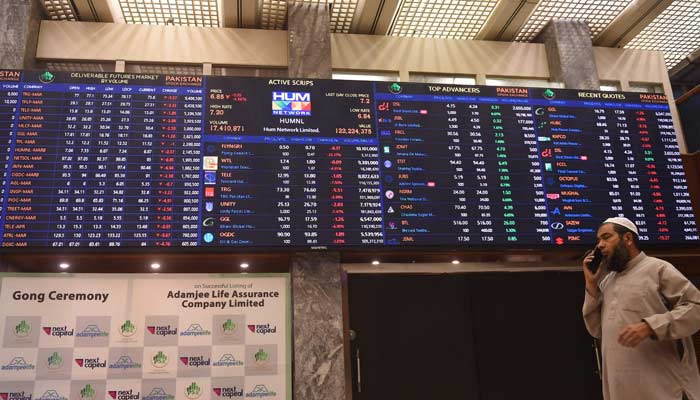- Benchmark KSE-100 index surges 4.9% during the week.
- Gains come on the back of clarity on the political front.
- A weekly rally of a similar extent was last witnessed in April 2020.
KARACHI: The outgoing week proved to be an outstanding one for the stock market as it recorded phenomenal gains on the back of clarity on the political front.
The KSE-100 index surged 4.9%, marking the highest week-on-week increase in two years, to settle at 46,601 points. A weekly rally of a similar extent was last witnessed in April 2020.
In the outgoing week, the market roared back after political clarity emerged. Following Prime Minister Shehbaz Sharif’s oath-taking ceremony, the new coalition government began work to tackle the economy.
Moreover, the rupee recovered against the dollar at a rapid pace, marking a 3.6% appreciation. Additionally, the country received record-high remittances this month clocking in at $28.3 billion, showing a 28% increase month-on-month, on account of Ramadan and Eid.
Other major developments during the week were: SBP’s reserves slip below $11 billion, banks approved Rs180 billion in housing loans, Pakistan Telecommunication Authority (PTA) renewed mobile operator licence for $486 million, cars’ sales surged 53.78% in nine months, Rs1 billion Islamic finance facility for renewable energy power plants, weekly inflation witnessed the biggest rise since November.
Meanwhile, foreign buying was witnessed this week, clocking in at $1.29 million against a net sell of $3.78 million recorded last week. Buying was witnessed in technology ($2.21 million), and fertiliser ($1.16 million).
On the domestic front, major selling was reported by a mutual fund ($9.89 million), followed by insurance companies ($7.76 million).
During the week under review, average volumes clocked in at 477 million shares (up by 213% week-on-week), while average value trade settled at $66.3 million (up by 135.6% week-on-week).
Major gainers and losers of the week
Sector-wise positive contributions came from commercial banks (+395 points), fertiliser (+292 points), technology and communication (+268 points), cement (+241 points), and refinery (+129 points). On the flip side, negative contributions came from real estate investment trust (-2.19 points), and vanaspati and allied industries (-1.55 points).
Scrip-wise major gainers were Engro Corporation (+152 points), TRG Pakistan (+136 points), Meezan Bank (+122 points), HBL (+85 points) and Systems Limited (+80 points). Meanwhile, major losers were Colgate-Palmolive (-14 points), Faysal Bank (-10.88 points), Fatima Fertilisers (-4.74 points), Allied Bank (-3.18 points), and Dolmen City REIT (-2.19 points).
Outlook for next week
A report from AHL predicted: “We expect the market to remain positive in the upcoming week. With the commencement of the result season and clarity on the political front, certain sectors and scrips are expected to stay under the limelight.”
“Furthermore, we are expecting the rollover of Chinese loans worth $2.3 billion and IMF negotiations, will help bolster our foreign exchange reserves.,” it said, adding that any dip in oil prices should also have a positive impact on the equity bourse.
“The KSE-100 is currently trading at a PER of 5.0x (2022) compared to the Asia-Pacific regional average of 11.5x while offering a dividend yield of 8.3% versus 2.6% offered by the region,” the brokerage house stated.

 Latest News3 days ago
Latest News3 days ago
 Latest News3 days ago
Latest News3 days ago
 Entertainment3 days ago
Entertainment3 days ago
 Latest News3 days ago
Latest News3 days ago
 Latest News3 days ago
Latest News3 days ago
 Latest News3 days ago
Latest News3 days ago
 Latest News3 days ago
Latest News3 days ago
 Latest News3 days ago
Latest News3 days ago

























